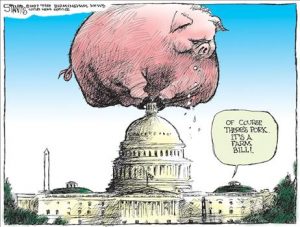
Stantis, Scott. “Of Course There’s Pork.” Birmingham News. Alabama: Birmingham , 2001. Print.
Because I consider myself politically-inclined, I suppose what stands out to me most from this week’s lesson is the immense scale and scope of corporate agribusiness’ power in our society. For all of the benefits it has brought, and there seem to be many, to be sure, it also carries enormous costs for our environment, health, and culture. Why is it that corn and soy are and have been so heavily subsidized for so long? Who benefits from that arrangement? It is difficult to unravel the complex web of relationships that is our United States Farm Bill, but it seems to me to mirror the intractable political situation we find ourselves in on the national level. Here we have this behemoth that is the food-industrial complex, that we ourselves created, but it is unclear how we got here, what alternatives there might be, or steps that the average citizen can take to address it. I think perhaps the first step would be to gain a greater understanding of the world food system and Michael Pollan’s In Defense of Food enables us to do just that.

First off, I love that cartoon. But more on topic something that surprised me this lesson (module 3) was the way that the subsidies we put on corn, soy, wheat, rice, and cotton are mostly benefiting the manufacturers, not the consumers, or farmers. In the example from the book The Real Cost of Food the author shows how soda companies who adopted the use of high fructose corn syrup instead of cane sugar saved some 2 billion dollars over two decades. This is mostly because they could purchase HFCS at discount prices due to corn subsidies. However, the book also claims that there was no corresponding decrease in the price of soda for consumers. Also, the book claims that the American farmer was getting less and less of every “food dollar” (Carolan pg. 69). This means that in this case the people who benefited the most form the subsidies were not farmers or consumers but the manufacturers themselves. Also mentioned in the book is the way the subsidies are turning off the signals the market sends to stop producing a product, because producing a subsidized product will always generate a profit (Carolan pg. 72). Not to say that subsidies do not help farmers or that the cost of foods has not gone down because of subsidies. But that perhaps as our readings mention that the subsidies encourage manufactures to make more and more processed foods if they want the biggest bang for their buck. This leads me to believe that the subsidies we are putting on food are mostly profited off of by the food processors and manufacturers.